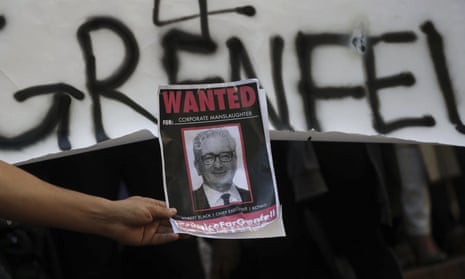The chief executive of the organisation that managed Grenfell Tower is still being paid his full salary despite resigning from the role after the fire that killed at least 80 people, the Guardian understands.
Robert Black remains on the books of the Kensington and Chelsea Tenant Management Organisation and is believed to be receiving a six-figure salary while he helps the organisation respond to multiple investigations.
A spokesman for KCTMO confirmed that Black was being paid as before the blaze, but said assisting multiple inquiries into the causes and aftermath was a full-time job.
“There’s a dual role for the TMO at the moment,” the spokesman said. “One is to make sure we cooperate as fully as we can with the inquiry process and the other is that we have an essential service to provide to tenants across the borough.”
A survivors’ group voiced its unhappiness at the situation. “It is ludicrous and outrageous that he is being paid anything,” said Yvette Williams, a campaign coordinator for the Justice4Grenfell group.
One of the inquiries Black is helping with is the public inquiry into the fire, which will be formally opened on Thursday by the retired appeal court judge Sir Martin Moore-Bick.
“No one else is being paid a salary to participate in the public inquiry. I don’t think people will be very happy about this, but they have the right to know,” Williams said. “It is the old boys’ network: we always look after our own regardless of what they have done. Class and money still operates here. This is it.”
Black stepped aside in June “in order that he can concentrate on assisting with the investigation and inquiry”, KCTMO said in a statement at the time.
His precise salary is not made public, but the latest accounts filed by the organisation with Companies House show “key management personnel”, led by Black, shared £760,000 in salaries.
Three other executives, described as senior management in accounts, remain in their posts. They are Sacha Jevans, Yvonne Birch and Barbara Matthews.
An interim chief executive, Elaine Elkington, has been appointed to oversee the running of KCTMO’s remaining council housing in the Royal Borough of Kensington and Chelsea (RBKC). She previously spent 10 years at Birmingham city council, latterly as strategic director of homes and neighbourhoods.
The organisation is also assisting investigations by the London fire brigade and Metropolitan police, which is examining possible corporate manslaughter. In August, Theresa May confirmed that the TMO would be removed from the management of Lancaster West estate, where Grenfell Tower stands.
KCTMO’s main source of income is an £11m annual management fee from the borough to look after its housing stock. RBKC declined to comment on the payments to Black.
The organisation and RBKC are set to be key players in the independent inquiry, which begins in central London on Thursday with an opening statement from Moore-Bick.
The launch comes 13 weeks after the fire and with 60 of the victims so far identified. They range in age from Logan Gomes, who was stillborn in hospital on 14 June and has been counted by police as a victim, to Abdeslam Sebbar, 77.
A live televised relay of proceedings at the Connaught Rooms in Covent Garden will be shown to local residents at Notting Hill Methodist church close to the burned-out hulk of Grenfell Tower.
The inquiry is not expected to start taking evidence until next month at the earliest.
The latest inquest opened on Wednesday. The Westminster coroner, Dr Fiona Wilcox, heard that the remains of Amna Mahmud Idris, 27, were discovered on the 23rd floor and identified through her DNA.
The shadow housing secretary, John Healey, urged the government not to use the inquiry “as a further excuse to delay urgent measures to keep high-rise tenants safe” across other parts of the country and said “the support for Grenfell Tower survivors has been woeful”.
Healey told Sajid Javid, the communities secretary: “Last week, on 5 September, you reported to the House of Commons that only two households had moved into new permanent accommodation. What action are you taking to rectify this failing? Why is this process still so slow, and when will all survivors be rehoused in new permanent accommodation in the local area?”
He also reiterated his call for sprinklers to be retrofitted in tall housing blocks and demanded an immediate rewriting of building regulations.
Speaking ahead of the inquiry opening, Javid said in a statement: “Three months on from the Grenfell Tower tragedy the images from that terrible night are understandably still with us all.
“It’s this that makes me determined to make sure in the coming weeks and months the government continues to support the people of North Kensington. Whether it’s professional counselling support for families, a temporary school for the start of a new term or emergency financial assistance, we are listening and working with the council and others to provide whatever support is necessary.
“Above all I am determined that we learn every lesson possible to ensure a tragedy like this never ever happens again.”
